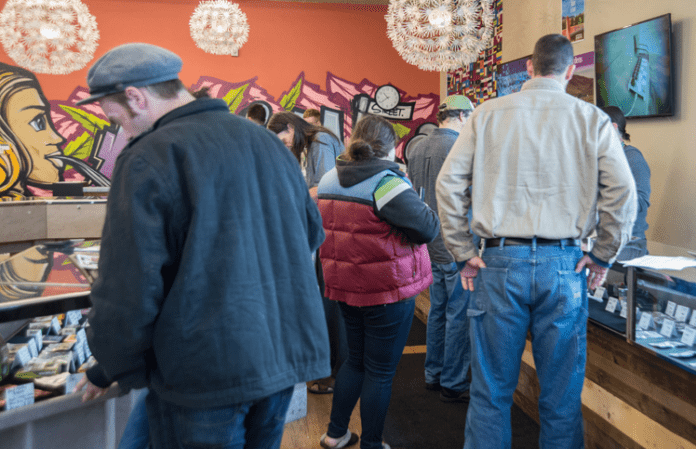Marijuana dispensaries in Southwest Washington lost about 37 percent in sales and tax revenue in the month October, according to data from the Washington State Liquor and Cannabis Board.
“Opening up 100 stores [in Portland] within driving distance is tough on everyone,” said Gareth Kautz, who owns High End Market Place, a marijuana retailer in Vancouver.
Vancouver retailers took a hit when medical marijuana dispensaries in Portland began selling recreational cannabis buds on Oct. 1.
And because Oregon isn’t taxing its recreational sales until January 2016, Portland residents are incentivized to stay in Oregon for the convenience and lower cost. People pay a 37 percent excise recreational marijuana tax, plus state tax, in Washington.
But Vancouver does offer some cannabis products that Oregon doesn’t yet allow.
“We’re still lucky to be able to sell products that Oregon is not yet selling – edibles, concentrates and vaporizer cartridges,” said Jim Mullen, co-owner of The Herbery in Vancouver. “But next year, when Oregon allows those types of sales, we will see [another] decrease in sales revenues.”
Up until October, Battle Ground and Vancouver had been the only areas in the Portland metro with recreational weed sales. Washington gave the green light for recreational sales in July 2014.
While Portland residents have been able to buy medical marijuana in Oregon, they had to travel across the Columbia River to recreational stores in Southwest Washington – the main reason sales have been so strong.
Vancouver dispensaries have averaged about $1.8 million in tax revenue per month over the summer, compared to about $1.1 million in October.
Besides Oregon’s new legislation, other factors have caused Southwest Washington’s sales to drop, including costs and competition.
“The fall harvest has always had an impact on recreational, black and medical markets,” said Kautz. “You get about a half-price drop in the fall because you don’t pay for air conditioning or electricity required with indoor growing in the winter.”
Currently, dispensaries in Southwest Washington are only licensed to sell recreational marijuana, but many of them have applied for and received a state medical endorsement to sell medical marijuana beginning July 2016.
The state will still require customers with medical marijuana cards to pay the 37 percent excise tax, but they won’t have to pay regular sales tax. People will also be able purchase more product in one visit than what’s currently allowed for Washington recreational sales – 1 oz. of dried marijuana, up to 7 grams of concentrated marijuana and up to 16 oz. of edibles.
It’s still unknown what impact medical marijuana will have on sales.
“A lot of people don’t want to be on a registry and say that they’re using medical marijuana, said Loren Carlson, who owns Cannabis Country Store in Battle Ground. “With the small difference in price, I would not see that our sales would increase a great deal.”
Besides medical sales, more change is on the horizon. The City of Vancouver will soon decide whether to allow three more marijuana dispensaries to open within city limits.
“I would love if the city stayed at six,” said Mullen. “We should wait to find out what the market share is after medical [marijuana] rolls out, and how Oregon will impact our sales. The future is clearly unknown.”






